Close search
 Published :
/
Published :
/ Posted by : Retech
Posted by : RetechFeed is relatively expensive for chicken farms, and reducing feed waste and improving feed utilization can reduce a lot of breeding costs and improve breeding efficiency. So, how to reduce feed waste? What measures need to be taken? This article introduces 10 tips for reference.
1.The feed mix should be comprehensive
The combination of feed must be in accordance with the feeding standards, otherwise too high nutrient content will easily lead to waste, and insufficient nutrient content will affect the full play of chicken production performance. Therefore, the nutritional components of the feed should be full and balanced, and the types of feed ingredients should be diversified as much as possible.
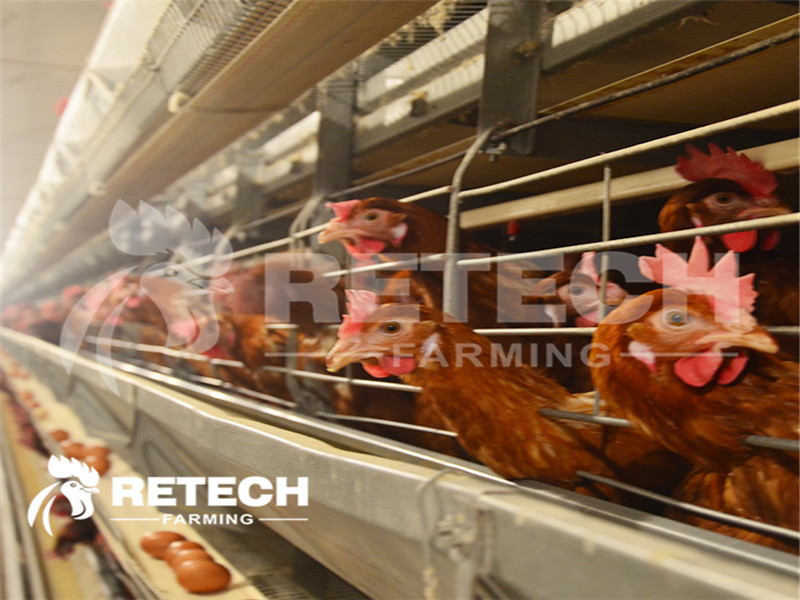
2.The structure of the trough should be reasonable
Unreasonable trough structure and placement height will cause a large amount of waste of feed, which can be as high as about 12%. If the feed trough is too small, too shallow, without eaves or placed too low, the chickens are easy to fiddle with the feed overflow. Too large, too deep or placed too high will affect the feeding and growth of chickens.
Retech's fully automatic cage equipment has a reasonable trough structure and effectively reduces feed waste. It has been successfully applied to many projects and is welcomed by farmers.
Therefore, according to the age of the chicken, choose the appropriate size of the eaves trough, and it is advisable to place the edge above the height of about 2 cm above the back of the chicken.
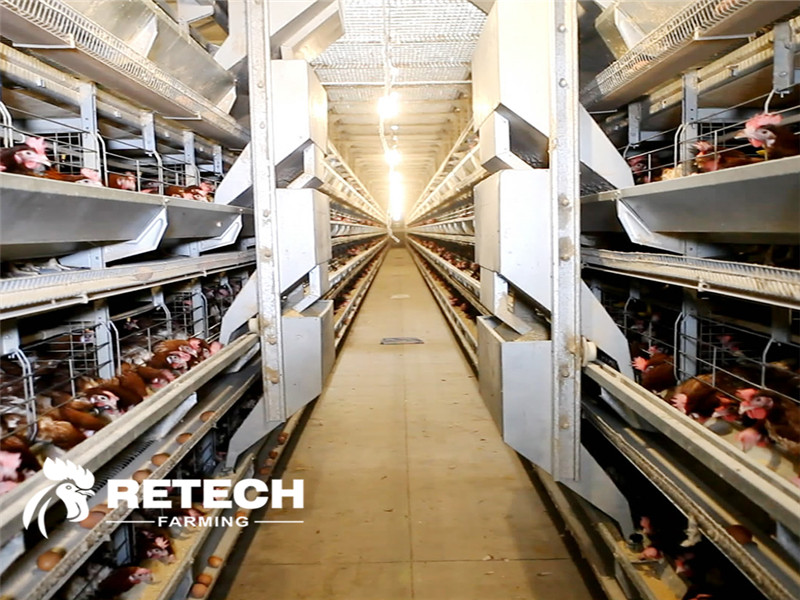
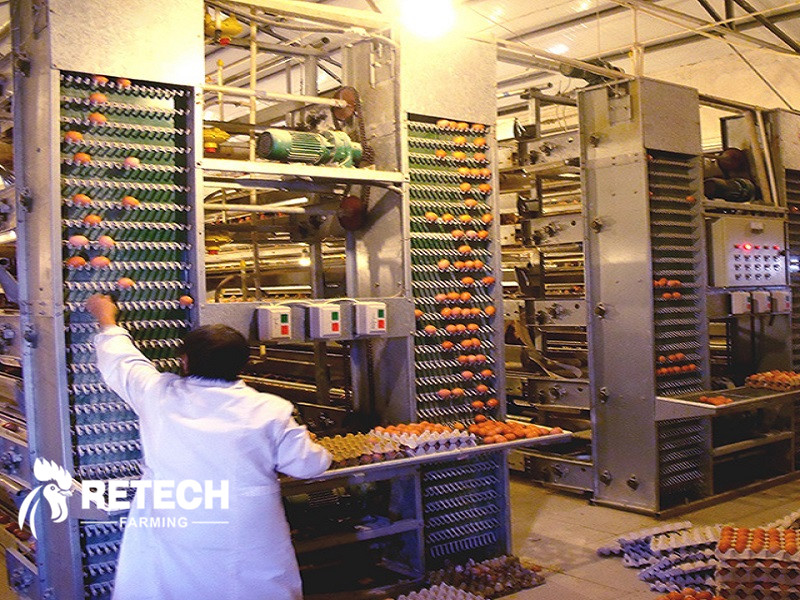
3.Add the right amount at a time
In chicken production, the amount of feeding at one time should not exceed 1/3 of the depth of the trough.
4.Pay attention to preventing birds and rodents
Sparrows and mice not only steal feed, but also easily spread diseases, so we should pay attention to preventing sparrows and rodents.
5.Timely inspection and maintenance of feeding equipment
When feeding mechanically, the feeding situation should be checked frequently, and if the feed is blocked or the equipment is damaged and leaking, it should be repaired and dredged in time to reduce unnecessary feed waste.
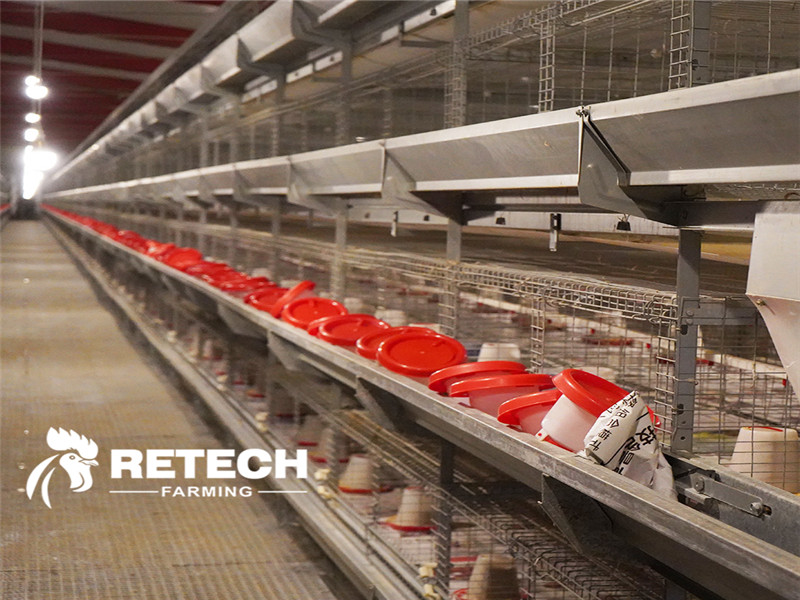
6.Scientific storage feed
If the feed is stored improperly, it will cause mildew and deterioration, increase fat oxidation and reduce the feeding value. Therefore, the storage feed should be protected from light, ventilation, and insects. This should be checked frequently, and if a problem is found, it should be dealt with in time.
7.The temperature of the chicken house should be appropriate
If the temperature of the chicken house is too low, chickens need higher energy to prevent cold, but the increase in feed intake will affect the utilization rate of feed. Therefore, in winter, attention should be paid to heat preservation and cold protection, and the temperature in the chicken house should not be lower than 10 °C to reduce the energy consumption of the chicken body and reduce the waste of feed.
8.Timely beak cutting
Beak cutting can not only prevent the occurrence of flock pecking, but also effectively reduce feed waste by 5-7%. The general beak cutting time is 6-9 days old and 12 weeks old respectively.
9.Chicken flocks should eliminate roosters in time
In the brooding stage, male chicks consume about 25% more feed than female chicks. If it is not eliminated in time, it will not only consume more materials, but also waste feed area, consume more manpower and material resources, and also interfere with the normal life of the mother chick and affect its growth and development, so it should be eliminated in time.
In addition, the male-female ratio of breeder flocks should be appropriate, because each rooster eats about 10 kg more than hens in one year. Generally, the male-female ratio of laying hens is 1:15-20 and that of broiler chickens is 1:9- 14 is appropriate.
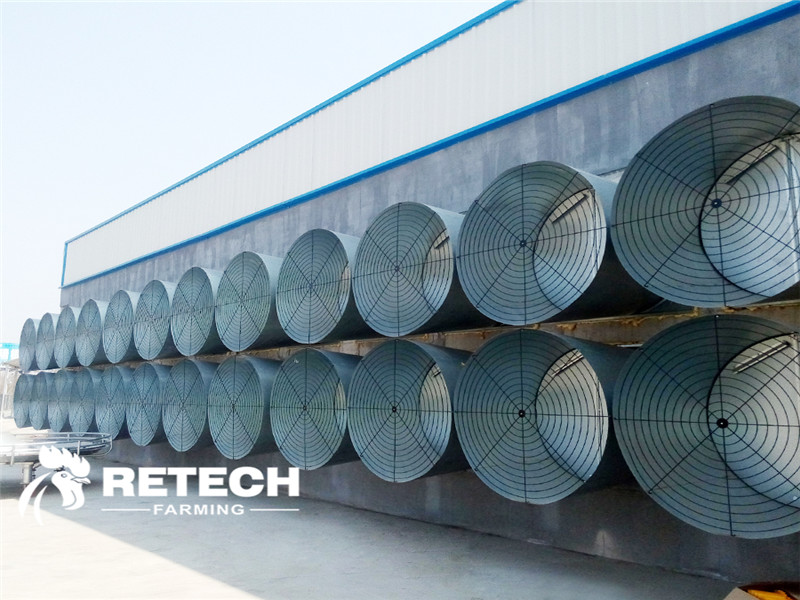
10. Eliminate sick, weak, disabled and widowed and discontinued chickens at any time
Under normal circumstances, sick, weak, disabled, oligo-producing, and discontinued chickens account for 5-8% of the total number of hens, and as many as 11%. Most of these chickens do not produce eggs or have a very low egg production rate. disuse.
RETECH FARMING is a production solution provider focusing on providing smart poultry solutions for small and medium-sized chicken poultry farms.